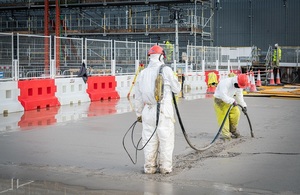We reign when we pour
News story
Want concrete proof of our commitment to deliver the infrastructure we need on the Sellafield site?

The Sellafield Product and Residue Store Retreatment Plant finishing its last floor slab.
Last week 2 of our biggest projects on the Sellafield site were busy creating the huge slabs which form the ground floors of the buildings.
The Sellafield Product and Residue Store Retreatment Plant (SRP), which is the facility that will provide safe storage of our special nuclear material, finished their slab, a year to the day from when it started.
And elsewhere on the Sellafield site the SIXEP Continuity Project carried out the first pour on their construction site, welcoming contractor Careys to help deliver the work.
The SIXEP Continuity Plant (SCP) is being built alongside Sellafield’s Site Ion Exchange Effluent Plant, or SIXEP – what is referred to as ‘the kidneys of the site’. SIXEP does vital work to clean our liquid effluents before discharged to sea.
Both are classed as billion-pound mega projects and are being delivered through our ground-breaking Programme and Project Partners approach.
When finished the facilities will be integral parts of our mission to create a clean and safe environment for future generations.
The final SRP pour marked a hefty 8,374m3 of concrete laid, reinforced with 1,230 tonnes of steel.
Martin Chown, Chief Executive, Sellafield Ltd was on-site at SCP to see its first pour, he said:
It was great to be on site to see the first concrete pour on the SCP construction site, the visible beginning of the construction of this vital facility.
I had the chance to meet with some of the construction team and see first-hand their commitment to delivering our infrastructure with passion and pride, always with safety at the forefront.
As that first delivery of concrete arrived at SCP, the last delivery took place at another of our mega projects, the SRP – showing the pace of change across our site.
Published 10 February 2021